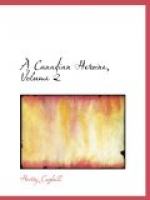He found himself perpetually losing the thread of some relation or dissertation which was intended for his benefit, and that of Hunsdon under his rule; he ran serious risk of displeasing Mr. Beresford, and finally he became so weary of thinking incessantly of one subject, but never speaking of it, that he made up his mind to take his cousin to some degree into his confidence. To some degree only—it could be a very small degree indeed, according to his ideas, for he could not tell her all, even of the little he knew, about the Costellos, and he had no intention of speaking much about Lucia, only mentioning her as an old playfellow of his sister’s; quite forgetting that he would have either to change his own nature, or to dull Lady Dighton’s ears and eyes, before he could talk of her, and not betray himself.
But a good opportunity for this confidence seemed hard to find, and whenever one did really occur Maurice let it slip, so that time passed on, and nothing was said; until at last, a new trouble came, so heavy and incomprehensible as entirely to eclipse the former ones.
One morning, about six weeks after his arrival at Hunsdon, there arrived for Maurice two Canadian letters and a newspaper; the letters from his father and Mrs. Costello, the newspaper addressed by Harry Scott. Maurice dutifully opened Mr. Leigh’s letter first; he meant just to see that all was well, and then to read the other; but the news upon which his eye fell, put everything else for the moment out of his head. He glanced half incredulously over what his father said, and then tore open the newspaper to seek for its confirmation. He had not far to seek. Two columns of the thin provincial sheet were scored with black crosses, and bore the ominous heading, “Dreadful Murder!” in the largest capitals. He read the whole terrible story through, and thought, as well as he could, over it, before he remembered the second and still unopened letter.
But no sooner had he opened and read this, than the news which had just before seemed to bring the most fearful realities of life and death so near to him, faded away almost out of his recollection to make way for the really personal interest of this calamity. Mrs. Costello wrote,
“I have done wrong; and I should feel more difficulty, perhaps, in asking you to forgive me, if I did not, with you, have to regret the bitter disappointment of my hopes and wishes. You and Lucia must not meet again, unless, or until, you can do so without any thought of each other except as old playfellows and friends. This sounds cruel, I know, and unreasonable,—all the more so after the confidence there has been between us lately; but you must believe me when I say that I have tried, more than I ought, to keep for myself the consolation of thinking that my darling would some day be safe in your care, and that this consolation has been torn from me. But what can I say to you? My dear boy, only less dear to me than Lucia, I know




